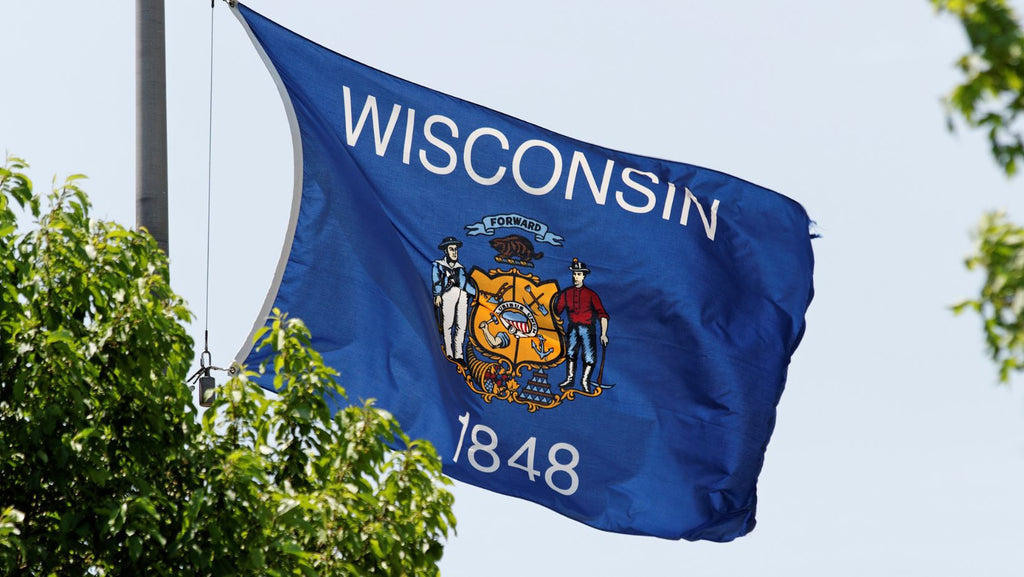
Is Kratom Legal in Wisconsin? Full Facts
Explore kratom's legal status in Wisconsin, legal challenges, penalties, advocacy and more. Stay informed about local kratom laws.
Is Kratom Legal in Wisconsin?
Kratom plant, derived from the leaves of the Mitragyna speciosa tree, is currently illegal in Wisconsin. The state's stance on kratom is clear, as it classifies the primary alkaloids found in kratom—mitragynine and 7-hydroxymitragynine—as Schedule I controlled substances.

This categorization was established under Wisconsin Statute 961.14, which lists substances that are deemed to have no accepted medical use and a high potential for abuse. As a result, any activities involving the possession, sale, distribution, or manufacture of kratom are strictly prohibited.
Violating these regulations can lead to significant legal consequences, including fines and imprisonment, mirroring the penalties associated with other Schedule I substances.
Current Legal Status of Kratom in Wisconsin: What You Need to Know
Despite ongoing debates and advocacy efforts nationally regarding the medical and therapeutic potential of kratom, the legal status of kratom in Wisconsin has remained unchanged since 2014. The state's authorities have placed kratom alongside other substances considered dangerous and without medical benefit.
For those living in or visiting Wisconsin, it's crucial to recognize this legal context to avoid facing severe penalties. There has been little motion towards legal reform or reevaluation of kratom's status, partly due to the lack of large-scale, conclusive studies proving its safety and efficacy.
Anyone interested in the legality of kratom or potential changes should stay informed through trusted sources and community advocacy groups, as state laws can evolve in response to new findings or public health initiatives.
The History of Kratom Legislation in Wisconsin
The legislative history of kratom in Wisconsin dates back to 2014 when the state officially added the two primary alkaloids in kratom, mitragynine and 7-hydroxymitragynine, to its list of Schedule I controlled substances.
This decision followed concerns similar to those expressed in other states about the safety and potential abuse of kratom, paralleling the rise of synthetic drugs and novel psychoactive substances.

The classification was intended to curb what was perceived as an emerging threat before it could become a widespread public health issue. Unlike some states where kratom has seen periods of legality, or where natural kratom has been distinguished from synthetic analogs, Wisconsin’s laws have consistently maintained a blanket prohibition.
Attempts to change these laws have been minimal, reflecting either a lack of legislative priority or continued caution among lawmakers regarding kratom's use.
This firm stance places Wisconsin among the handful of states with strict regulations against any use of kratom, maintaining its position unless future legislative efforts or shifts in federal policy create a pathway for legal change.
Understanding State Laws: Why Kratom Might Be Illegal in Wisconsin
Kratom's illegal status in Wisconsin can be attributed to several factors that influenced state lawmakers' decisions. Primarily, the state's classification of kratom's main alkaloids, mitragynine and 7-hydroxymitragynine, as Schedule I controlled substances was driven by concerns over potential abuse, addiction, and public safety.
State authorities often parallel such decisions with the trends seen at the federal level, where the DEA has expressed concerns about kratom's safety profile and its potential for dependency. Wisconsin's decision reflects a cautious approach towards substances that have not been thoroughly vetted or approved by the FDA for medical use, aiming to prevent any possible health crises related to unregulated substances.

Furthermore, the lack of comprehensive, peer-reviewed research on kratom at the time of its ban played a significant role. The state’s laws are often preemptive, aiming to control a substance before it becomes a widespread issue, similar to the legislative actions taken against synthetic drugs and other psychoactive substances.
This preventive strategy is indicative of a broader philosophy of minimizing potential risks associated with substances that have both reported medicinal benefits and potential for harm, focusing heavily on the latter in the case of kratom.
Advocacy and Efforts to Change Kratom's Legal Status in Wisconsin
Despite kratom's current legal status in Wisconsin, there has been ongoing advocacy and efforts to change its classification.
These advocates include a mix of kratom users, healthcare professionals, and organizations like the American Kratom Association (AKA), which actively campaigns for the regulation and legal reform of kratom across the United States.
Key points in the advocacy efforts include:
- Education and Awareness: Informing lawmakers and the public about kratom's potential benefits and safe use.
- Promoting Research: Supporting scientific studies to provide evidence-based information on kratom's efficacy and safety.
- Regulatory Proposals: Advocating for state-level regulations that allow kratom to be sold legally with proper quality controls and age restrictions.
- Legislative Lobbying: Meeting with state legislators to discuss the potential reclassification of kratom as a regulated but legal substance.
- Community Engagement: Organizing events and forums where users can share their positive experiences with kratom.
- Public Petitions: Gathering signatures to show widespread support for kratom's legality.
These efforts focus on shifting the perception of kratom from a potentially dangerous drug to a beneficial herbal supplement with appropriate regulation.
Comparing Wisconsin's Kratom Laws to Other States
Wisconsin's strict stance on kratom places it among the few states with a complete ban on the substance. Unlike Wisconsin, several other states have adopted a more regulated approach, allowing the use of kratom under specific legal frameworks.
For example, states like Nevada, Utah, Georgia, and Arizona have passed the Kratom Consumer Protection Act, which regulates the production, sale, and labeling of kratom products to ensure purity and safety for consumers.
On the other hand, states like Alabama, Arkansas, Indiana, Rhode Island, and Vermont, similar to Wisconsin, classify kratom's primary alkaloids as Schedule I substances, effectively banning their sale, possession, and use.

In contrast, states like Colorado and Illinois have taken a middle-ground approach. In Colorado, kratom is legal except in Denver, where it is banned for human consumption. Illinois allows kratom for those over 18, except in Jerseyville where it is banned.
These variations reflect differing local perspectives on the balance between public health concerns and individual freedom regarding natural substances like kratom.
Here's a comparative table outlining the legal status of kratom in various states:
|
State |
Legal Status of Kratom |
Specific Regulations |
|
Wisconsin |
Illegal |
Schedule I controlled substance |
|
Nevada |
Legal |
Kratom Consumer Protection Act |
|
Utah |
Legal |
Kratom Consumer Protection Act |
|
Georgia |
Legal |
Kratom Consumer Protection Act |
|
Arizona |
Legal |
Kratom Consumer Protection Act |
|
Alabama |
Illegal |
Schedule I controlled substance |
|
Arkansas |
Illegal |
Schedule I controlled substance |
|
Indiana |
Illegal |
Schedule I controlled substance |
|
Rhode Island |
Illegal |
Schedule I controlled substance |
|
Vermont |
Illegal |
Schedule I controlled substance |
|
Colorado |
Legal (except Denver) |
Banned in Denver for human consumption |
|
Illinois |
Legal (18+, except Jerseyville) |
Age restriction, local ban in Jerseyville |
Shipping Kratom to & From Wisconsin
Shipping kratom to and from Wisconsin is illegal due to its classification as a Schedule I controlled substance within the state.
Individuals and businesses must refrain from sending or receiving kratom products, like kratom powders and kratom capsules, to avoid legal repercussions, including potential fines and imprisonment. This prohibition extends to both personal shipments and commercial distributions.
For those in Wisconsin interested in kratom, it's essential to recognize that purchasing, shipping, or possessing kratom in any form within state boundaries is against the law.

For businesses and individuals outside of Wisconsin, it's critical to understand the legal status of kratom in both the shipping origin and destination. Failure to comply with state laws can result in severe penalties, including business license revocation and legal charges.
Companies that operate in the kratom industry typically have stringent policies to ensure compliance with federal and state regulations, often using sophisticated systems to prevent shipping to states where kratom is banned.
For residents of states where kratom is legal, it's advised to verify the vendor's compliance with local and state regulations to ensure that all transactions are lawful and safe.
Legal Alternatives to Kratom in Wisconsin
For those in Wisconsin seeking alternatives to kratom for managing pain, enhancing mood, or boosting energy, there are several legal options available.
These alternatives do not carry the same legal risks as kratom in Wisconsin and can often be just as effective for certain uses:
- CBD (Cannabidiol): Derived from the hemp plant, CBD is legal in Wisconsin and is used to manage pain, anxiety, and insomnia. It does not induce a high and is known for its therapeutic properties.
- Kava: Known for its calming effects, kava is a beverage made from the roots of the kava plant, primarily found in the Pacific Islands. It is used to reduce anxiety and promote relaxation without impairing cognitive functions.
- Valerian Root: Often used as a sleep aid, valerian root is effective for insomnia and anxiety. It's available in capsule or tea form and is a popular herbal remedy.
- Ginseng: Widely used for its energizing properties, ginseng is a legal herb in Wisconsin that boosts stamina and mental clarity.
- Passionflower: Known for its calming effects, passionflower can be used to treat anxiety, insomnia, and certain forms of pain. It is available as teas, tinctures, and capsules.
- Magnesium Supplements: Magnesium is effective for muscle relaxation and nerve function and can be an excellent supplement for managing stress and minor pain.
These alternatives provide various therapeutic benefits and are accessible within legal frameworks in Wisconsin, offering residents legal ways to manage their health concerns.
How Wisconsin's Kratom Laws Affect You
The legality of kratom in Wisconsin has significant implications for residents and visitors. As kratom is classified as a Schedule I controlled substance, possession, sale, or use of kratom can lead to severe legal consequences, including fines and imprisonment.
This strict regulation affects individuals seeking natural remedies for conditions like chronic pain, anxiety, and depression, for which kratom is often used in other states.

Moreover, the legal status of kratom impacts researchers and healthcare providers who might be interested in exploring kratom’s potential medicinal benefits. The classification as a Schedule I substance limits scientific research and discussion within the medical community, potentially stalling advancements in understanding kratom’s full therapeutic potential.
For consumers, the ban means a lack of access to what many believe is a critical tool for managing health independently.
Future Prospects: Will Kratom Ever Be Legal in Wisconsin?
The future legality of kratom in Wisconsin is uncertain, largely dependent on evolving legal interpretations, scientific research, and advocacy efforts.
If new research can definitively demonstrate kratom's safety and medical benefits, there might be a push to reclassify the substance and change its legal status. Advocacy groups such as the American Kratom Association are actively working to educate lawmakers and the public about kratom’s benefits and promote legislation that could lead to regulation rather than prohibition.
Furthermore, changes in federal policy regarding kratom could influence state laws, including those in Wisconsin. If kratom were to be recognized at the federal level as a regulated but legal substance, Wisconsin might reconsider its stance.
However, until significant changes are made at either the state or federal level, kratom is likely to remain illegal in Wisconsin.
Conclusion: The Ongoing Debate Over Kratom's Legality in Wisconsin
The debate over kratom’s legality in Wisconsin reflects broader national discussions about the use of natural substances for health and wellness purposes.
While some view the state’s strict stance as a necessary measure to prevent potential abuse and protect public health, others see it as an impediment to personal freedom and access to alternative treatments. As research continues and public opinion potentially shifts, Wisconsin’s laws may evolve.
For now, those interested in the use of kratom must navigate the complexities of the legal landscape, stay informed about legislative changes, and consider legal alternatives to manage their health.
This ongoing debate is sure to continue as more information becomes available and as community and legislative perspectives evolve.
FAQs: Addressing Your Questions About Kratom in Wisconsin
1. Can I legally bring kratom into Wisconsin if I purchased it legally in another state?
No, it is illegal to possess kratom in Wisconsin regardless of where it was purchased.
2. What are the penalties for possessing kratom in Wisconsin?
Possessing kratom can lead to charges similar to those for other Schedule I substances, including potential fines and imprisonment.
3. Are there any ongoing legislative efforts to legalize kratom in Wisconsin?
As of now, there are no active legislative efforts that would legalize kratom, but this could change as new advocacy efforts emerge.
4. Can I participate in advocacy groups to change the legal status of kratom?
Yes, you can join groups like the American Kratom Association, which works to promote kratom awareness and support legal changes.
5. Is it safe to order kratom online to a Wisconsin address?
Ordering kratom to be shipped to a Wisconsin address is illegal and could result in legal consequences for both the buyer and seller.
6. How can I stay updated on changes to kratom's legal status in Wisconsin?
Staying in touch with local advocacy groups and monitoring state legislation updates are good ways to stay informed.
7. Has there been any recent kratom-related legislation in Wisconsin that I should know about?
No recent legislation has been passed regarding kratom in Wisconsin, but it's important to stay informed about potential changes.
8. What should I do if I was unaware of the kratom ban and currently possess kratom?
It's advisable to dispose of any kratom immediately and familiarize yourself with state laws to avoid legal issues.
9. Can health professionals in Wisconsin prescribe kratom for medicinal purposes?
No, kratom cannot be prescribed or recommended by health professionals in Wisconsin due to its Schedule I status.
10. Are there any exceptions to the kratom ban in Wisconsin for medical or research purposes?
Currently, there are no exceptions in Wisconsin for the possession or use of kratom, even for research or medicinal purposes.
Share

